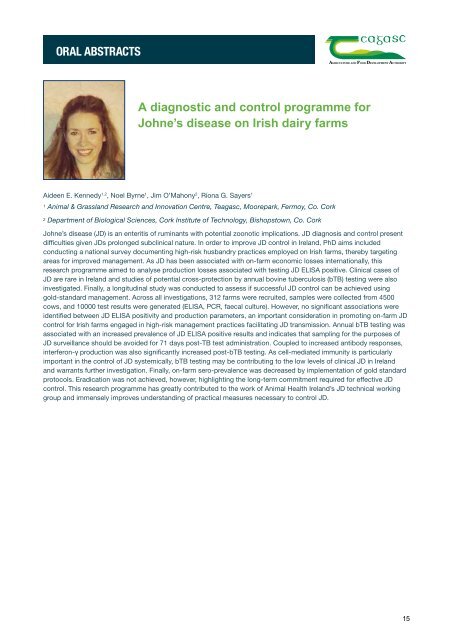FellowshipS Seminar 2016
2fFF9y9
2fFF9y9
Create successful ePaper yourself
Turn your PDF publications into a flip-book with our unique Google optimized e-Paper software.
Oral ABSTRACTS<br />
A diagnostic and control programme for<br />
Johne’s disease on Irish dairy farms<br />
Aideen E. Kennedy 1,2 , Noel Byrne 1 , Jim O’Mahony 2 , Ríona G. Sayers 1<br />
1 Animal & Grassland Research and Innovation Centre, Teagasc, Moorepark, Fermoy, Co. Cork<br />
2 Department of Biological Sciences, Cork Institute of Technology, Bishopstown, Co. Cork<br />
Johne’s disease (JD) is an enteritis of ruminants with potential zoonotic implications. JD diagnosis and control present<br />
difficulties given JDs prolonged subclinical nature. In order to improve JD control in Ireland, PhD aims included<br />
conducting a national survey documenting high-risk husbandry practices employed on Irish farms, thereby targeting<br />
areas for improved management. As JD has been associated with on-farm economic losses internationally, this<br />
research programme aimed to analyse production losses associated with testing JD ELISA positive. Clinical cases of<br />
JD are rare in Ireland and studies of potential cross-protection by annual bovine tuberculosis (bTB) testing were also<br />
investigated. Finally, a longitudinal study was conducted to assess if successful JD control can be achieved using<br />
gold-standard management. Across all investigations, 312 farms were recruited, samples were collected from 4500<br />
cows, and 10000 test results were generated (ELISA, PCR, faecal culture). However, no significant associations were<br />
identified between JD ELISA positivity and production parameters, an important consideration in promoting on-farm JD<br />
control for Irish farms engaged in high-risk management practices facilitating JD transmission. Annual bTB testing was<br />
associated with an increased prevalence of JD ELISA positive results and indicates that sampling for the purposes of<br />
JD surveillance should be avoided for 71 days post-TB test administration. Coupled to increased antibody responses,<br />
interferon-γ production was also significantly increased post-bTB testing. As cell-mediated immunity is particularly<br />
important in the control of JD systemically, bTB testing may be contributing to the low levels of clinical JD in Ireland<br />
and warrants further investigation. Finally, on-farm sero-prevalence was decreased by implementation of gold standard<br />
protocols. Eradication was not achieved, however, highlighting the long-term commitment required for effective JD<br />
control. This research programme has greatly contributed to the work of Animal Health Ireland’s JD technical working<br />
group and immensely improves understanding of practical measures necessary to control JD.<br />
15




